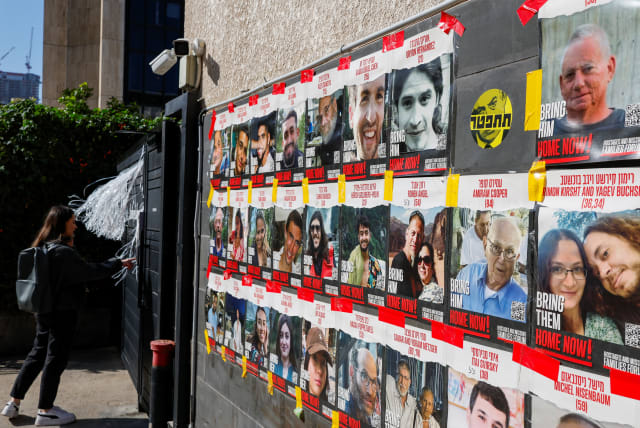'Hostage-taking could become Palestinian national sport', former Mossad agent warns

A former Mossad official believes that negotiations with Hamas would not only see the release of terrorists but would set a dangerous precedent for hostage-taking.
Rami Igra, the former head of Mossad's Prisoners and MIA Division, was interviewed on Wednesday morning by Udi Segal and Anat Davidov on Radio 103FM.
In the interview, he discussed the hostage deal materializing between Israel and Hamas. He expressed his opinion as to why this deal is bad for Israel.
"The State of Israel must change the paradigm of hostage-taking. Anyone who has blood on their hands and is released in the framework of a hostage deal must meet their death shortly after their release," Igra stated.
"On the day of his [the prisoner's] release, he will decide what is better - three meals a day or to die in another two weeks. Around a year ago, Palestinian detainees in Israeli hospitals were set to be released to Gaza. No one wanted to go because it was better to die here than there."
"You must remember, this release is not just about people - this release is political," he said and explained: "What we did in the Shalit deal is that we colossally strengthened Hamas among the Palestinian population, both in the West Bank and Gaza. What will happen in the next deal is that if, among other things, we bring our loved ones home, it will result in Hamas becoming very, very strong, and this has implications and a price paid in blood, as was the case with the Shalit deal."
Igra added that "a survey recently conducted on social media in Gaza shows that Hamas is getting stronger. Hamas is looking at its basic goal, which is to survive and return to its condition on October 6th, so it can become stronger, rebuild itself, and fulfill its goal of the destruction of Israel."
Israel's strategy moving forward
"Israel must not agree to pause the war, to allow the return of residents to northern Gaza as Hamas demands - both women and children - because it will mean loss of Israeli control of the territory. Until the day after the war, the situation in Gaza must not be changed. That day will come; we must remain patient. We, as the public who are concerned with freeing the remaining hostages, must remain patient; it takes time. The other side is not waiting for a deal, but rather using the Israeli public and the hostages against us - and it's working," he explained.
Igra expressed his opinions on how Israel must act: "wisdom, not necessarily popularity."
"The State of Israel, in its actions, is submitting to the will of the Americans, to the will of Israelis who want a deal - hocus pocus. After all, what is this about? The release of a tiny portion of the total hostages and the release of murderers strengthened Hamas in a very significant way in Gaza and the West Bank. The Palestinians will learn that only by force they can engage with Israel. And most dangerously - hostage-taking becomes a Palestinian national sport."
Despite this, he said that, in his opinion, Hamas is not interested in a ceasefire and negotiations: "I suggest everyone look at the basic situation. In the bigger picture, it is clear that Hamas has no real interest in reaching a deal with Israel, certainly not at this stage."
"This word, 'now,' is what the public asks for. Another 'deal' is a word I abhor. Hamas will agree to deals with a price. It is unclear why all this is being carried out and who is conducting this negotiation because Israel is acting in the direction of 'we will release the not important [prisoners], and Hamas will continue and wait for the continuation of the war,' this is what Israel is asking for - it will not happen."
Igra went on to explain, "Hamas sees that the whole world is starting to put pressure on Israel, European countries are sitting on these decisions on a demand for a humanitarian ceasefire, and from there, the end of the war completely. Canada announced yesterday that it will stop exporting weapons. So Hamas looks at this from the other side, from the situation in Gaza. They are waiting for the world to stop the war, for the State of Israel to bring it upon itself, and they will conduct hostage negotiations from a completely different position, from the position of a survivor."
Jerusalem Post Store
`; document.getElementById("linkPremium").innerHTML = cont; var divWithLink = document.getElementById("premium-link"); if (divWithLink !== null && divWithLink !== 'undefined') { divWithLink.style.border = "solid 1px #cb0f3e"; divWithLink.style.textAlign = "center"; divWithLink.style.marginBottom = "15px"; divWithLink.style.marginTop = "15px"; divWithLink.style.width = "100%"; divWithLink.style.backgroundColor = "#122952"; divWithLink.style.color = "#ffffff"; divWithLink.style.lineHeight = "1.5"; } } (function (v, i) { });

